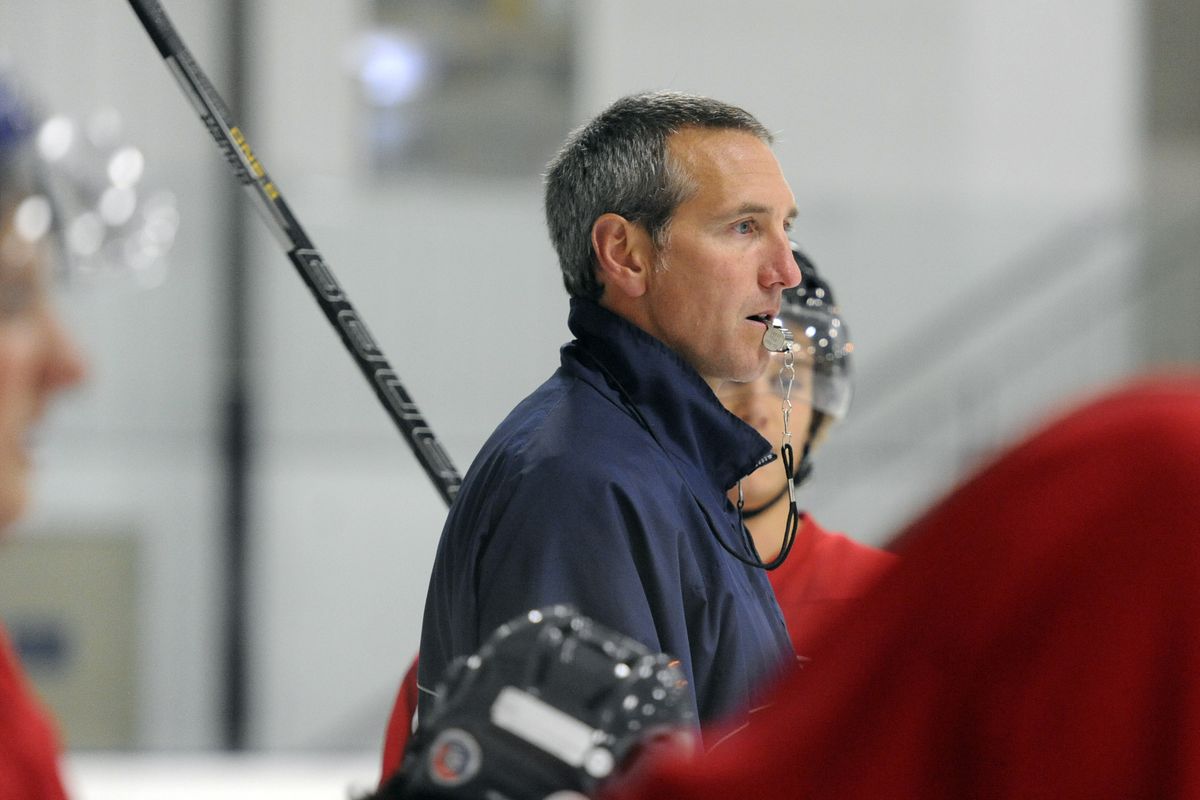All in the family: Reddings live, breathe Spokane Braves hockey

Gary Redding fondly recalls running around the old Spokane Coliseum as a young boy, following the progress of the junior hockey team his father founded.
“Who would have thought, 40 years later, that I’d be involved with the team, and helping to keep it solid in any way I can?” Redding said.
The Spokane Rockets of Gary Redding’s childhood no longer exist, but Spokane has had an uninterrupted stretch of four-plus decades in the Kootenay International Junior Hockey League since Ralph Redding put the first team together in 1972.
Gary Redding is the new head coach of the Spokane Braves, the team that followed the Rockets (1972-74) and the Flames (1974-85) into a league that has no other American teams.
The Redding family connection to the team goes further. Gary’s older brother, Don, played for the team in its early stages. Oldest son Nick, 21, played four seasons with the Braves and is serving as an assistant coach this season. Middle son Kurtis, 18, is on the roster for a third consecutive year.
Marina Redding also keeps the team running smoothly during its home games at Eagles Ice-A-Rena.
“She’s here all the time, helping out with stuff,” Nick said of his mother. “She’s kind of the off-ice lady, doing all the in-between- period activities, helping out in the beer garden. She’s everywhere.”
For those in the dark about the Braves, their league and their level of play, here’s an encapsulated history:
The West Kootenay Junior Hockey League was founded in 1969 with five teams. When Ralph Redding brought the Rockets into the fold in 1972, the league changed its name to the KIJHL to reflect the “international” flavor of the addition of an American team.
The Rockets, later the Flames and Braves, changed ownership hands a few times until current owners Bob and Cathy Tobiason took over a quarter-century ago.
The Braves operate as a kind of hybrid between Hockey Canada and USA Hockey. Their roster of 23 is stocked with players 16 to 20 years old. Each league team is limited to two 16-year-olds and five 20-year-olds. Each team is also limited to eight import players. In the Braves’ case, that means eight players from outside Washington.
The KIJHL is considered a developmental league. Junior hockey is divided into three levels, with the Spokane Chiefs playing at the top rung (major junior) and the Braves playing at the bottom (Canadian B).
The Braves’ roster typically changes by one-half each season.
“What we try to do is to move kids on to where they want to be, but some kids choose to stay here the whole time,” Gary said.
KIJHL teams play a 52-game regular-season schedule. It’s not unusual for the season, from tryouts to postseason, to stretch eight months. The postseason goal is to capture the league championship and advance to the four-team Cyclone Taylor Cup, which Nelson, British Columbia, hosts this season.
The league is divided into two conferences and four divisions. Spokane plays in perhaps the toughest division, the Neil Murdoch. The Braves have never captured the league championship and haven’t won their division since the 1991-92 season.
“We’ve kind of been in the middle of the pack, so we’d like to change that,” Gary said.
The Reddings would also like to increase the fan base, which hovers around 200 per night except for special “Buck Nights” that draw upward of 700.
“We’re lower than the Chiefs, so it kind of looks like a step down,” Kurtis said. “A lot of people don’t know about it and some people don’t give it a chance, but it’s a really good league with good players.”
“There hasn’t been a lot of talk about (the Braves) in the last five, six years,” said Nick, who plays for Eastern Washington University’s team in the British Columbia Intercollegiate Hockey League. “I don’t know why. It’s … a great place to be, a fun night out for families.”
Gary, who just earned his real estate license, said he’s ready to give his all to the Braves.
“Most people who learn about the team and come and watch say, ‘Wow, I didn’t know there was a team like that in Spokane,’ ” he said.